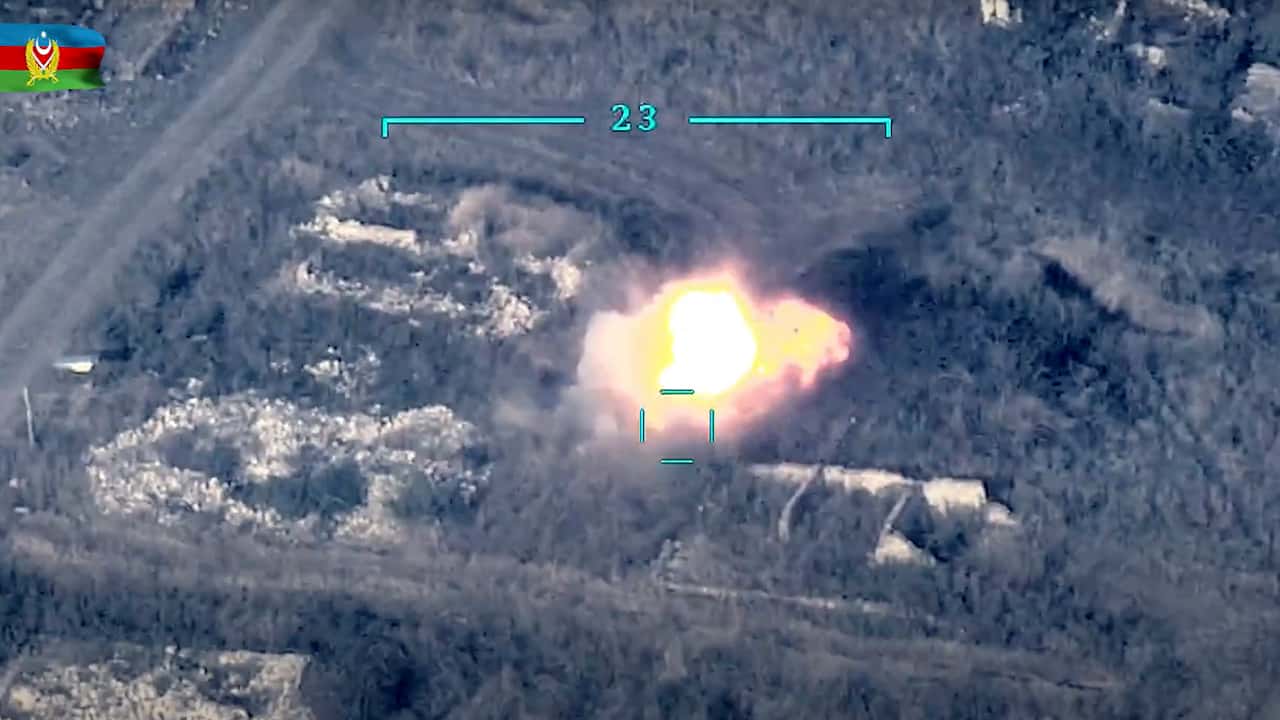Share
Armenia and Azerbaijani forces kept fighting Monday in the disputed mountainous region of Nagorno-Karabakh, which has been in a tense state of limbo since a 1994 truce between the two countries
Both sides blame each other for resuming the deadly attacks that reportedly have killed and wounded scores of people.
Armenia’s Honorary Consul in Fresno Addressed Conflict
The recurring conflict is of concern to Fresno’s large population of residents with Armenian heritage. Berj Apkarian, Honorary Consul of the Republic of Armenia in Fresno, told KSEE24, “It’s not a surprise, we were anticipating this to come.”
“Historically, the conflict has been between Armenia and Azerbaijan,” Apkarian said. “Now, Turkey is playing a very critical role in escalating the situation and causing instability in that region.
“All of a sudden the Azeri government is indicating that they do not want to engage in peace talks. They want to liberate the occupied territories.”
Apkarian said Armenia is committed to a peaceful resolution of the dispute over Nagorno-Karabakh.
Recent Increase in Tensions
The renewed hostilities broke out on Sunday morning. The European Union on Monday urged both sides to halt the fighting and return to the negotiating table, following similar calls by Iran, Russia, France and the United States.
Dr. Sergio La Porta, professor of Armenian Studies at Fresno State, noted tensions have been growing in the region..
“The anti-Armenian rhetoric from both the Republic of Azerbaijan and the Republic of Turkey has intensified recently, but it has always been there,” La Porta said.
But he is uncertain about what might have prompted the fighting to begin over the weekend.
“They (Azerbaijan and Turkey) may feel that the world is otherwise pre-occupied with other matters and therefore willing to overlook this type of conflict,” La Porta said. “But to be completely honest, I don’t know why Azerbaijan felt that Sept. 27 was a good time to attack. The biggest question is how the largest regional power, Russia, will play this out long term.”
Calls for U.S. Response
State Sen. Andreas Borgeas (R – Fresno) posted a message on his Twitter account Monday in support of Armenia in the conflict.
“The despicable Azeri attacks on the Armenian people are reprehensible and must be strongly condemned by the international community,” Borgeas wrote.
He called on the U.S. government to take punitive steps against Azerbaijan and Turkey. “In a time when democratic values and fundamental human rights are being threatened by authoritarian forces,” Borgeas’ message said, “the United States must be prepared to respond to these acts of hostility.”
The coordinator of Fresno State’s Armenian Studies program said the U.S. needs to put pressure on Azerbaijan and Turkey to withdraw from Nagorno-Karabakh.
“People in Fresno can call, text, email their representatives asking the US to take a stronger stance to stop the violence initiated by Azerbaijan,” Barlow Der Mugrdechian said in an email message to GV Wire.
The Associated Press explains what’s behind the long-unresolved conflict:
What and Where is Nagorno-Karabakh?
Karabakh is a region within Azerbaijan that has been under the control of ethnic Armenian forces and the Armenian military since the 1994 end of a full-scale separatist war that killed about 30,000 people and displaced an estimated 1 million.
Nagorno-Karabakh proper has an area of about 1,700 square miles — about the size of the state of Delaware — but Armenian forces occupy large swaths of adjacent territory.

How Did the Conflict Start?
Long-simmering tensions between Christian Armenians and mostly Muslim Azeris began boiling over as the Soviet Union frayed in its final years. Once the USSR collapsed in 1991 and the republics became independent nations, war broke out.
A 1994 cease-fire left Armenian and Azerbaijani forces facing each other across a demilitarized zone, where clashes were frequently reported.

What’s Happened Since?
International mediation efforts to determine the region’s final status have brought little visible progress.
The conflict has been an economic blow to the Caucasus region because it has hampered trade and prompted Turkey to close its border with landlocked Armenia.
Fighting periodically breaks out around Nagorno-Karabakh’s borders, often deadly, notably in 2016 and this July. Since new fighting erupted Sunday, dozens have been killed and wounded in apparent shelling by both sides. Each country blamed the other for sparking the clashes.
What’s the Broader Impact?
In addition to causing local casualties and damage, the conflict in the small, hard-to-reach region is also of concern to major regional players.
Orthodox Christian Russia is Armenia’s main economic partner and has a military base there, while Turkey has offered support to Azerbaijanis, ethnic brethren to Turks and fellow Muslims. Iran neighbors both Armenia and Azerbaijan and is calling for calm.
Meanwhile, the United States, France and Russia are meant to be guarantors of the long-stalled peace process, under the auspices of the Vienna-based Organization for Security and Cooperation in Europe.
RELATED TOPICS:
Categories

Iran Retaliates Against Israel and US Allies



















